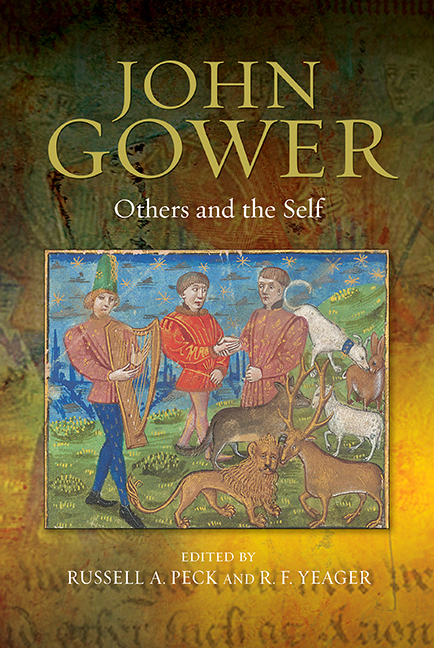Book contents
- Frontmatter
- Contents
- List of Illustrations
- Abbreviations
- Introduction
- PART I KNOWING THE SELF AND OTHERS
- PART II THE ESSENCE OF STRANGERS
- PART III SOCIAL ETHICS, ETHICAL POETICS
- 11 Gower's Governmentality: Revisiting John Gower as a Constitutional Thinker and Regiminal Writer
- 12 Gower's Speculum Iudicis: Judicial Corruption in Book VI of the Vox Clamantis
- 13 “The Lucre of Marchandie”: Poet, Patron, and Payment in Gower's Confessio Amantis
- 14 Hidden Matter in John Gower's Confessio Amantis
- 15 Writing the Cinkante Balades
- 16 Gower in Early Modern Spanish Libraries: The Missing Link
- Bibliography
- Index
- VOLUMES ALREADY PUBLISHED
13 - “The Lucre of Marchandie”: Poet, Patron, and Payment in Gower's Confessio Amantis
from PART III - SOCIAL ETHICS, ETHICAL POETICS
Published online by Cambridge University Press: 30 April 2019
- Frontmatter
- Contents
- List of Illustrations
- Abbreviations
- Introduction
- PART I KNOWING THE SELF AND OTHERS
- PART II THE ESSENCE OF STRANGERS
- PART III SOCIAL ETHICS, ETHICAL POETICS
- 11 Gower's Governmentality: Revisiting John Gower as a Constitutional Thinker and Regiminal Writer
- 12 Gower's Speculum Iudicis: Judicial Corruption in Book VI of the Vox Clamantis
- 13 “The Lucre of Marchandie”: Poet, Patron, and Payment in Gower's Confessio Amantis
- 14 Hidden Matter in John Gower's Confessio Amantis
- 15 Writing the Cinkante Balades
- 16 Gower in Early Modern Spanish Libraries: The Missing Link
- Bibliography
- Index
- VOLUMES ALREADY PUBLISHED
Summary
In School-days of Eminent Men (1858), John Timbs promises to narrate “the early buddings of genius, and formation of character, through which may be gained glimpses of many of the hidden thoughts and secret springs by which masterminds have moved the world.” His brief entry on Richard II is notable for its focus upon Gower; in the section titled “The Education of Richard II—His Patronage of Gower,” Timbs writes,
One of the bright lights of this reign, Gower, was patronized by Richard […] [Gower] wrote his principal work, the Confessio Amantis, in consequence of Richard II meeting him in his state barge on the Thames, and asking him to ‘book some new thing;’ his gravity led to his being called ‘the moral Gower.’ He stands halfway between the minstrel of Normandy and the English poet, and he seems to have transferred the faults of a declining literature into the language of one newly arisen.
It is not surprising that Timbs (a nineteenth-century antiquarian of prodigious output) and his Victorian audience so casually glosses over Richard II's reign (especially given the Watt Tyler “unpleasantness”), or that rather than focus on Chaucer as the instrumental voice of Richard's reign Timbs constructs an image of a “newly arisen” English vernacular literature deriving from Richard's “patronage” of Gower.
Timbs refers, of course, to the so-called patronage scene in the Ricardian recensions of the “Prologue” to the Confessio Amantis, wherein (at least in the early recensions of the poem) the narrator of the “Prologue” to the Confessio is summoned aboard Richard's barge and asked by Richard to compose something new. Whether or not this scene marked a consequential moment in Richard II's education, as Timbs suggests, it certainly has become one of the defining moments of Gower criticism, given the presence of that scene in the Ricardian recensions of the Confessio and its removal in the Lancastrian recensions; one of the more persistent issues in Gower studies has been understanding these dedicatory changes between versions of the Confessio Amantis. Nigel Saul, for example, argues that Gower's rationale for switching allegiances was Richard's failure to exhibit moderate self-rule, as evidenced by Richard's lack of selfdiscipline in incidents from the 1380s and 1390s which include the king's quarrel with the City of London in 1392, a quarrel cited as far back as Fisher for this change.
- Type
- Chapter
- Information
- John Gower: Others and the Self , pp. 283 - 294Publisher: Boydell & BrewerPrint publication year: 2017

